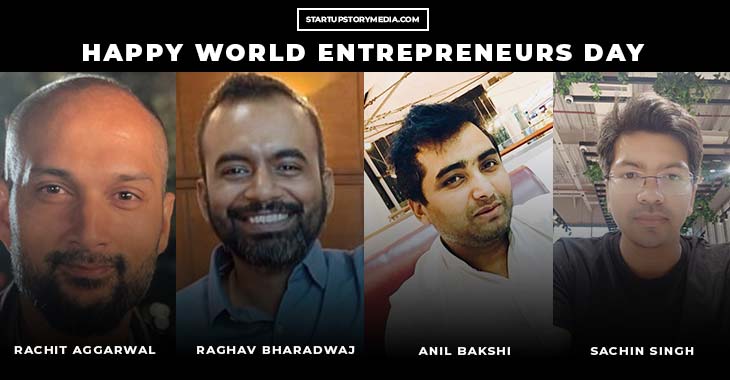Entrepreneurial Choices: MBA’s Edge vs. Startup’s Grit
- ByVinayak Shete | August 22, 2023

On the occasion of World Entrepreneurship Day, the prevailing debate centers around the choice between joining an early-stage startup right after graduation and pursuing an MBA program. Which option is more advantageous for aspiring entrepreneurs aiming to establish their own companies? While articles from reputable sources like The Economic Times tend to focus on the perspectives of founders of successful startups/companies such as Fireflies AI, Physics Wallah, Credgenics, and Insurancedekho, there remains an unexplored angle in this discussion.
This angle involves individuals who are already embarked on their careers, pursuing executive MBAs, and nurturing aspirations to either initiate or work on their startups. What prompts these individuals to opt for an MBA at this stage, and what insights do they bring to this debate? If the prevailing notion is that entrepreneurship is best learned by participating in early-stage startups, why do a substantial number of individuals still choose to pursue executive MBAs at this career juncture?
Conducting secondary research exclusively through online sources reveals that around 10% of startups fail within their first year, with 23% of these failures attributed to team-related issues. An article published in The Economic Times underscores that only 20% of startups endure beyond 5 years, and a mere 8% make it past the 10-year mark. This indicates that those intending to glean experience from early-stage startup employment must be prepared for recurrent job changes due to the relatively high failure rate of startups. Consequently, they may inadvertently contribute negatively both to the startups they join and their own career trajectories in several ways:
Frequent Company Shifts: As a consequence of the precarious nature of startup ventures, individuals are compelled to switch employers frequently, leading to significant career insecurity. This results in a learning curve that inevitably surpasses two years, potentially exceeding the time required to complete an MBA course.
Team-related Failures: Given that 23% of startup failures stem from team-related deficiencies, individuals lacking formal business education or a business-oriented mindset may inadvertently perpetuate this issue.
Diminished Incentives: Furthermore, if an individual finds success in a startup role, the allure of a high-paying corporate job may diminish the motivation to relinquish that role and establish one’s own venture. Perspectives of Several Executive MBA Students from Faculty of Management Studies (FMS, Delhi) with an Entrepreneurial Background or Mindset
Raghav Bharadwaj (Manager/Technical and Quality, Delhi Metro Rail Corporation)

“Do we have time?: We all have limited agility, limited energy, and limited enthusiasm to leverage in our lifetime. ‘Learning-while-doing’ is undoubtedly more effective than the ‘classroom’ education, but considering time constraints and its relativity, this conviction becomes blur. Working in startups indeed helps you grow your entrepreneurial skills, but that path involves falling and learning, failing and learning, repeatedly, time and again. But, do we really have the time and appetite to go in this grind? An MBA allows us to learn from the mistakes others have made without actually committing them. The only question is, in a world full of self-proclaimed wisdom, how committed are we to learn beside the constant tick-tock of Life’s clock in the background. The choice is entirely ours.”
Sachin Singh (Ecommerce & D2C Head, Ecosoul Home Inc, Former director at Bundelkhand Organic Farm)

“In my view, starting with early-stage startups is the optimal choice for launching your own company. This journey offers genuine life lessons and a transformative mindset. You’ll traverse a path you’ve already learned from, or you can forge a new one based on risk assessment and product demands. Through this path, one gains insight into government policies and laws, practical experience, field knowledge encompassing markets, products, packaging, costs, and negotiation. This journey fosters decision-making skills and learning from errors. Additionally, you acquire knowledge about product materials and composition. On the other hand, pursuing an MBA is advisable if you seek a well-paying corporate role.”
Rachit Aggarwal (Director at Rhuman Fuel OPC Pvt Ltd, Agriculture, commercial broiler, dairy, organic vegetables and organic cash crop farming)

“This is a catch 22 situation!
In the world today, a lot of people wish to break away from the routine work life and start something of their own. To be able to prepare yourself for the tough world, I feel there needs to be a combination of theory and practical. Learn by falling in the hole at the same time take a course that prepares you with the possible solutions when you are in a problem. As an Entrepreneur you have to don a lot of different hats. The more exposure to knowledge the better will be the solution to your problems. Therefore, as important as it is for experience to teach you, taking up a relevant course like an MBA can be rather helpful.”
Anil Bakshi (Founder & CEO, Startup Story Media)

“My entrepreneurial journey thrives on the synergy of startup tenacity and MBA’s comprehensive framework. An Executive MBA provided fresh perspectives to assess my startup’s trajectory with advanced education’s depth. Insights armed me with a well-rounded outlook, fortified by practical wisdom from Startup Story’s evolution.
In the entrepreneurial landscape, the “startup vs. MBA” choice lacks a definitive answer. Both paths have merits shaped by risk appetite, learning styles, and long-term goals. I advocate a holistic approach, blending startup dynamism with strategic acumen from education. My journey, like Startup Story, underscores this symbiotic alliance’s potential, shaping ventures and entrepreneurs who dare to dream.”
“Keep taking small steps towards building your dream; slowly, you’ll surpass your starting point.”
All of these perspectives underscore the significance of both an academic foundation and real-life experiences for becoming a successful entrepreneur. This necessitates a combination of formal education, such as through internships and live projects, along with practical encounters. These viewpoints align with the findings of research conducted by insideiim.com, which elucidated the correlation between successful entrepreneurs and MBAs. The study revealed that among the top 10% of Indian unicorns, 50% of their founders held an MBA degree, while 36% of founders from the top 100 emerging startups also possessed an MBA.
The essence lies not merely in where one acquires knowledge, whether on the job or within a classroom setting, but rather in how one applies the acquired knowledge. As Harvard professor Tom Eisenmann articulated in his article “Why Start-ups Fail,” the triumph or collapse of a startup is not solely contingent on the founder or the startup concept itself. Eisenmann emphasized the pivotal role of a competent team as a crucial determinant of startup success. Here, an MBA degree assumes significance as it equips individuals with a competitive advantage, enabling them to evolve into more effective team members capable of contributing effectively to a startup’s requirements and fostering a prosperous entrepreneurial journey.
Moreover, an MBA imparts valuable insights gleaned from the triumphs and setbacks of others through case studies and business frameworks. This facet aids in the cultivation of a business-oriented mindset, which is indispensable for navigating the intricacies of entrepreneurship. In this context, an MBA serves as a conduit for imbibing lessons from past experiences, thereby enhancing an individual’s potential to thrive in the entrepreneurial landscape.
Author – Vinayak Shete (Manager Solution design: Addverb Technologies)










